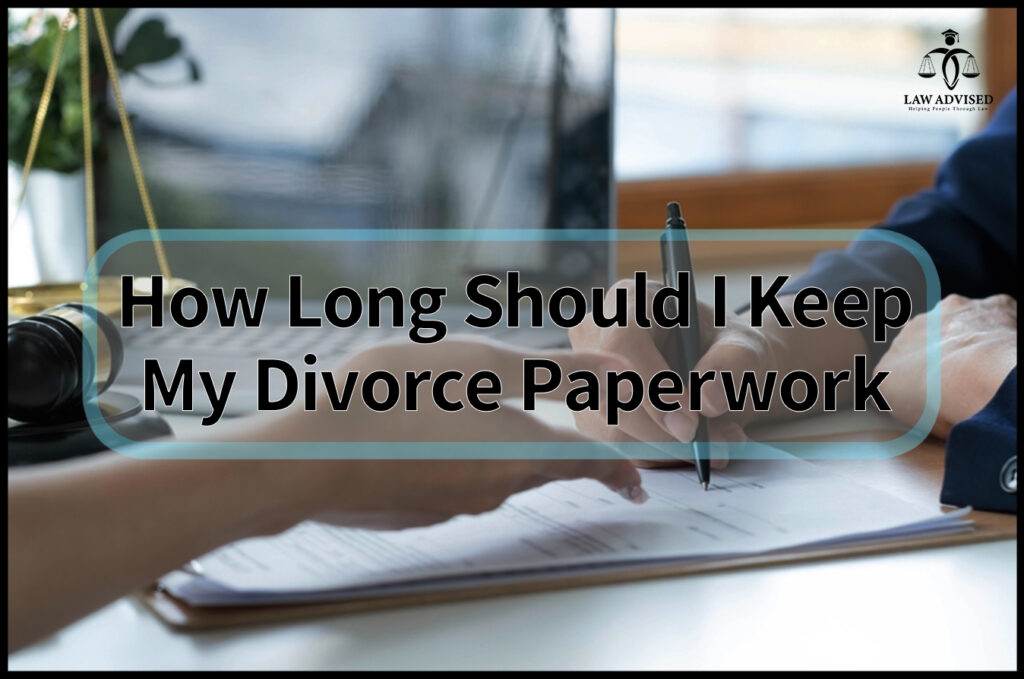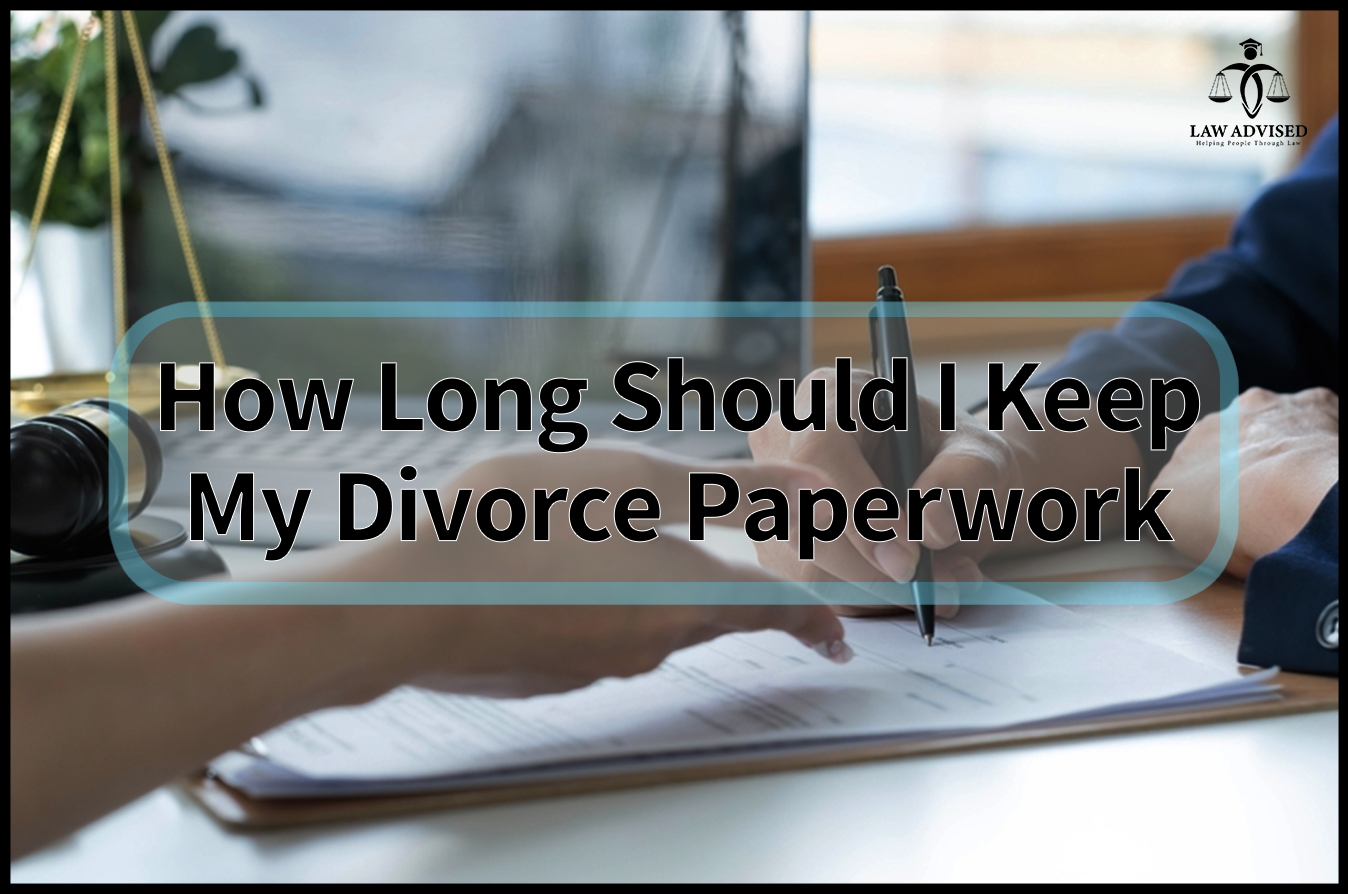Keep your divorce paperwork for at least six years after the finalization to ensure compliance with legal and financial requirements. Divorce is a significant life event that brings about a myriad of changes and transitions.
Alongside the emotional rollercoaster, there are important legal and financial matters that need to be addressed. One such aspect is the retention of divorce paperwork. Many wonder how long these documents should be kept, and this article aims to provide a clear answer.
By understanding the recommended timeframe for retaining divorce paperwork, individuals can navigate their post-divorce life with confidence and peace of mind. In the following paragraphs, we will delve into the reasons for keeping divorce paperwork, legal obligations and considerations, and additional tips for managing these essential documents effectively. So, if you’re wondering how long you should hold onto your divorce paperwork, read on to gain a clear understanding of this crucial step in the divorce process.
Simplify Your Post-split Paper Trail
Why is it important to keep divorce paperwork?
Organizing and keeping track of your divorce paperwork is crucial for several reasons:
- Legal Protection: Divorce papers serve as legal evidence of the dissolution of your marriage. Having these documents readily available can protect your rights and interests in the future.
- Property and Financial Matters: Divorce paperwork includes details about the division of assets, debts, and alimony. Keeping these records can help you resolve any future disputes and ensure fair treatment.
- Child Custody and Support: Divorce documents often outline arrangements for child custody, visitation, and support. Maintaining these records helps ensure the best interests of your children are fulfilled.
- Tax Purposes: Divorce paperwork can impact your tax filing. It is important to retain these documents to accurately report any necessary information.
Organizing and decluttering your divorce documents
To simplify your post-split paper trail, follow these tips:
- Sort and Label: Categorize your paperwork into relevant sections, such as property, finances, children, and court orders. Label each section clearly.
- Use Folders or Binders: Keep your documents organized in folders or binders, separating them using dividers for easy access.
- Digitize: Consider scanning and saving your paperwork electronically. This reduces physical clutter and ensures backup copies.
- Secure Storage: Store physical copies in a safe and secure location, such as a locked filing cabinet or a fireproof box.
- Retention: Consult a legal professional or refer to local guidelines to determine the recommended duration for retaining divorce paperwork.
The recommended duration for retaining divorce paperwork
| Document Type | Recommended Retention |
|---|---|
| Divorce Decree | Lifetime |
| Child Custody and Support Agreements | Until children reach adulthood |
| Property and Financial Agreements | 10 years |
| IRS Tax Returns | 6 years |
Properly organizing and retaining your divorce paperwork ensures you have the necessary information at your disposal and protects your legal rights and financial interests.
Understanding The Purpose Of Divorce Paperwork
Divorce paperwork plays a crucial role in the legal dissolution of a marriage. It serves as a record of the arrangements and agreements made during the divorce process, ensuring that both parties adhere to their obligations. Unpacking the different types of divorce documents can help you comprehend the significance of maintaining copies.
Divorce paperwork can include various documents such as the petition for divorce, financial affidavits, child custody and support agreements, property settlement agreements, and the final divorce decree. Each document serves a specific purpose, ranging from initiating the divorce proceedings to determining the division of assets and responsibilities. It is important to have a clear understanding of these documents to ensure you comply with the legal requirements and protect your rights.
The significance of maintaining copies of divorce paperwork cannot be overstated. Keeping copies of all the relevant documents provides you with evidence of the legally binding agreements and any necessary court orders. It also allows you to refer back to the terms of the divorce settlement in the future, particularly when issues arise regarding child custody, visitation, or financial support. Furthermore, having copies readily available can save time and money should you need to provide proof of your divorce in legal or financial matters.
Factors To Consider When Deciding How Long To Keep Divorce Paperwork
Deciding how long to keep your divorce paperwork depends on various factors, including legal requirements and statutes of limitations. Each jurisdiction has its own rules regarding the retention of divorce paperwork, so it is important to consult the relevant laws in your area. You should also consider the relevance of your specific divorce case.
If there are ongoing legal issues or disputes, it may be necessary to keep the paperwork for a longer period. Consultation with legal professionals can guide the recommended duration. They can assess your situation and provide insight into any additional factors that may influence the decision. Ultimately, it is important to strike a balance between keeping the necessary paperwork for legal purposes and decluttering your records when it is appropriate to do so.
Streamlining Your Post-split Paper Trail
When it comes to organizing your divorce paperwork, sorting and cataloging is key. By implementing a systematic approach, you can easily locate and manage your important documents. To streamline your post-split paper trail, consider the following:
Sorting And Cataloging Your Divorce Paperwork
One effective way to manage your divorce paperwork is by sorting and cataloging them. Start by grouping related documents, such as financial records, custody agreements, and property settlement papers. You can further organize them by using color-coded folders or labeling each document with specific categories.
Creating A Digital Backup System
In addition to physical copies, it is essential to create a digital backup system for your divorce paperwork. Scan all the relevant documents and save them as electronic files. Keep them organized in separate folders on your computer or external hard drive.
Utilizing Cloud Storage For Secure Document Management
To ensure the safety and accessibility of your divorce paperwork, consider utilizing cloud storage services. Cloud storage providers offer secure and encrypted platforms to store your digital files. This allows you to access your documents from anywhere and anytime, while also providing an extra layer of protection against loss or damage.
By implementing these strategies, you can effectively manage and organize your divorce paperwork, allowing for easy retrieval when needed.
Identifying Essential Documents To Retain
When going through a divorce, it is essential to know how long you should keep your paperwork. Keeping a record of certain documents can help protect your rights and ensure a smooth process. Here are some key items you should consider retaining:
- Financial records and documentation: It is crucial to keep track of bank statements, tax returns, pay stubs, and any other financial records that show incomes, expenses, assets, and debts.
- Child custody and support agreements: If you have children, it is vital to keep copies of custody agreements, visitation schedules, and child support orders. These documents will help ensure that your children’s best interests are protected.
- Property and asset division documents: Retain any documents related to the division of property and assets, including real estate deeds, mortgage papers, insurance policies, and agreements concerning the division of bank accounts, retirement accounts, and investments.
By keeping these essential documents, you can have the necessary information readily accessible for any legal or financial matters that may arise during or after the divorce process. Remember to consult with a legal professional to determine the specific requirements for document retention in your jurisdiction.
Disposing Of Unnecessary Divorce Paperwork
When it comes to disposing of unnecessary divorce paperwork, it is important to consider how long you should keep these documents. Securely disposing of sensitive information should be your top priority to protect your privacy and prevent identity theft. One option is to shred the documents using a cross-cut shredder, which ensures that the information is effectively destroyed.
Afterward, you can recycle the shredded paper to minimize environmental impact. Additionally, it is recommended to maintain digital copies of the paperwork for future reference. Scanning the documents and saving them on a secure and password-protected digital storage system can save physical space and make it easier to access the information when needed. Remember to regularly review your paperwork and discard anything that is no longer necessary, to keep your divorce records organized and secure.
Maintaining A Clear Record-keeping System
Establishing a filing system for easy retrieval: When it comes to organizing your divorce paperwork, it is crucial to establish a filing system that suits your needs. Create clearly labeled folders or binders for each category of documents, such as financial records, court orders, and correspondence. Utilize dividers or color-coding to make it even easier to find specific documents. Place the most recent documents on top to maintain a chronological order.
Regularly reviewing and updating your records: To keep your divorce paperwork up to date, regularly review and purge unnecessary documents. This will help keep your filing system organized and prevent it from becoming overwhelming. Moreover, staying on top of updates ensures that you are familiar with the contents of your files and can easily retrieve any required information.
Ensuring accessibility for future needs: In addition to establishing and maintaining an organized filing system, it is important to ensure that your divorce paperwork is easily accessible when needed. Store physical copies in a secure location, such as a locked cabinet or safe, and consider creating digital backups. Cloud storage or external hard drives can provide convenient access to your digital records whenever necessary.
Frequently Asked Questions On How Long Should I Keep My Divorce Paperwork

How Long Should I Keep My Divorce Paperwork?
– You should keep your divorce paperwork for at least 10 years for legal and financial purposes.
What Should I Do If I Lose My Divorce Papers?
– If you lose your divorce papers, contact the courthouse where your divorce was finalized to obtain copies.
Can I Store My Divorce Paperwork Digitally?
– Yes, you can store your divorce paperwork digitally as long as you keep backups and ensure the files are secure.
Is It Necessary To Keep Physical Copies Of Divorce Documents?
– While not necessary, keeping physical copies of divorce documents can serve as an additional backup in case of digital file corruption.
Can I Dispose Of My Divorce Papers After Remarrying?
– It is recommended to keep your divorce papers even after remarrying, as they may still be required for various legal and financial purposes.
What Should I Do With Divorce Papers If I Move?
– If you move, make sure to update your address with the courthouse and keep your divorce papers in a safe and easily accessible location.
Are There Any Legal Consequences For Not Keeping Divorce Paperwork?
– While there may not be immediate legal consequences, not keeping divorce paperwork can lead to complications in the future when dealing with legal matters or for tax purposes.
How Can I Organize My Divorce Paperwork?
– You can organize your divorce paperwork by using labeled folders, creating a digital file system, or utilizing online document management services for easy retrieval and organization.
Conclusion
Keeping your divorce paperwork for a specific period is essential for various reasons. It ensures that you have all the necessary legal documents on hand, providing you with peace of mind and the ability to reference them if needed. By organizing and preserving your divorce paperwork, you can easily handle any future legal or financial matters.
Remember, each situation is unique, so consult with a legal professional to determine the best course of action for your specific circumstances.
Ismail Hossain is the founder of Law Advised. He is an Divorce, Separation, marriage lawyer. Follow him.





Leave a Reply